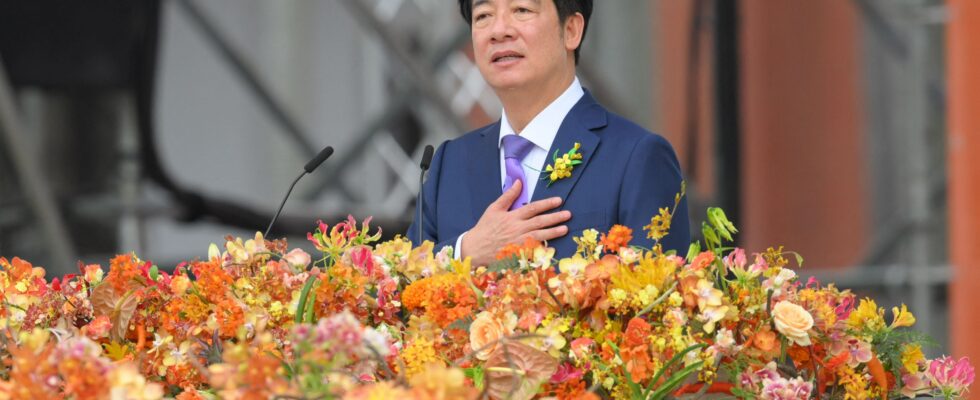He is the new face of Taiwan. After being sworn in on Monday, President Lai Ching-te, who also goes by the name William Lai, hailed the “glorious era” of Taiwanese democracy and called on China to “stop its political and military intimidation.”
In his inauguration speech at the Taipei Presidential Palace, Lai Ching-te spoke directly about the threat of war after years of pressure from China to bring Taiwan under its control. The new president thanked Taiwanese people for resisting the influence of “external forces and resolutely defending democracy,” saying that “the glorious era of Taiwanese democracy has arrived.”
“Faced with numerous threats and infiltration attempts, we must demonstrate our determination to defend our nation, we must also increase our defense preparedness and strengthen our legal framework in matters of national security,” noted Lai Ching-te after his input function.
Shared responsibility for peace
Coming from the Democratic Progressive Party (DPP), the same movement as his predecessor Tsai Ing-wen, he has been described by Beijing as a “dangerous separatist” for his past statements in favor of Taiwan’s independence. He has since softened his speech, and promised this Monday that his government “will not give in, will not provoke and will maintain the status quo”, that is to say a balance which preserves the sovereignty of Taiwan without declaring a formal independence.
He also called on China to “cease its political and military intimidation against Taiwan”. Beijing must “share with Taiwan the responsibility towards the world for maintaining peace and stability in the Taiwan Strait,” he argued.
Following on from his predecessor, Lai Ching-te is expected to increase military spending and strengthen ties with certain powers, including the United States, which is the main supplier of arms to Taiwan. At the same time, China unveiled new sanctions on Monday against three American companies selling weapons to Taiwan.
US Secretary of State Antony Blinken congratulated Taiwan President Lai Ching-te, whose inauguration is, according to him, the sign of a “resilient democratic system”. He said he hoped Washington and Taipei could strengthen their relations and maintain “peace and stability” in the Taiwan Strait region.
Lack of diplomatic recognition
The ceremony, during which the new vice-president, Hsiao Bi-khim, was also inaugurated, was held at the presidential palace in Taipei, the capital. As a show of support, eight heads of state attended as well as 51 international delegations (including the United States, Japan and Canada). Traditional dances and operas were performed by more than a thousand artists during the ceremony which also included a military air parade.
The island of 23 million people is governed autonomously, but China considers it part of its territory and has said it wants to bring it back under its control, by force if necessary. Before Lai Ching-te’s inauguration, Beijing’s Taiwan Affairs Office, which handles cross-Strait issues, said “Taiwan independence and cross-Strait peace” are “like water and water.” fire”. Chinese warplanes and ships maintain a near-daily presence around the island, but in the days leading up to the inauguration there was no significant increase in the number of planes and ships.
The son of a coal miner, President Lai has tried to reopen dialogue with China, which Beijing broke off in 2016, but experts say he risks being rebuffed.
Taiwan suffers from a lack of diplomatic recognition, having only 12 allies on the international scene. Although Washington abandoned diplomatic recognition of Taipei in favor of Beijing in 1979, it remained Taiwan’s most important partner and its main arms supplier.
The island has its own institutions, an army and its currency: the new Taiwan dollar. The majority of Taiwanese residents also believe they have their own Taiwanese identity, distinct from China, according to opinion surveys.
In addition to the Chinese threat, Lai Ching-te will face many other challenges during his term. The DPP lost its majority in parliament, where a fight broke out on Friday between elected officials from the three parties represented there, which could complicate Lai Ching-te’s task of getting his reforms adopted.
